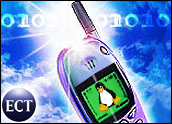
Access this week announced a Linux and open source software application framework for mobile devices, which will be open to developers under the Mozilla Public License.
The Access application framework is tuned for mobile phones and devices, and includes services for installing, managing and allowing communication between software applications.
The move is part of Access’ effort to grow the mobile Linux market globally. The company plans to work with standards groups, such as the Linux Phone Standards (LiPS) Forum and Open Source Development Labs (OSDL), in the process.
“We created the framework to ensure that applications can be well integrated and securely managed not just by us, but also by third-party developers, operators and all participants in the global mobile Linux ecosystem,” said Mike Kelley, Access executive officer and senior vice president of product development.
Access also signaled plans to release security feature extensions for the Linux kernel under the General Public License.
Foiling Fragmentation
In addition to pushing mobile Linux to the next level with a software framework designed specifically for mobile devices, opening the Access application framework will avoid fragmentation in the space.
The platform is designed to allow developers to create applications that blend seamlessly within installed device environments, as well tools that can extend mobile capabilities while maintaining integration and consistency.
“We believe open sourcing the application framework will benefit all mobile Linux developers, manufacturers and operators,” said Kelley. “[This], in turn, should help foster the growth of the mobile Linux phone and device market while helping to avoid potential fragmentation.”
Avoiding Monopoly
Mobile handset makers, as well as operating system and application vendors, look to Linux and open source with a common desire, DataComm Research President Ira Brodsky told LinuxInsider. Their hope is to avoid the kind of monopoly in the mobile space that occurred on the desktop with Microsoft Windows.
“There is a very open market for operating systems for mobile devices,” Brodsky said. “Open source solutions have the benefit that various players can create enhancements and give those back to the whole industry.”
Ironically, Microsoft has recognized the strength of open development by allowing work to be done on its Windows CE mobile operating system, which is different from the software giant’s own version, Windows Mobile, said Brodsky.
Open Ended
Players in the mobile device industry face some common challenges in power management, user interface, distributed applications issues and more, he noted. “All of it argues for, at some level, an open development environment — and open source is really taking that to its logical extension.” he said.
In addition, openness will play an increasingly significant role in the development of mobile hardware, claimed Brodsky. For example, incorporating radio modem technology into the operating system will require it. “Then everything’s already meshed together,” he remarked.

















































